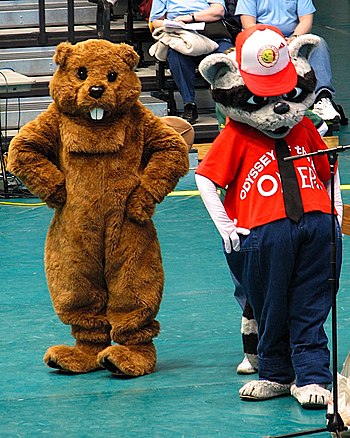
OMER the raccoon (right) is the mascot of Odyssey of the Mind, shown here with SNYPS, the New York state mascot. (Photo credit: Wikipedia)
{Published in the Colorado Springs Gazette, May 2, 2012}
Quick: What Colorado sports team just won its conference championship and is ranked #2 nationally? I’ll give you a hint: They play for an NCAA Division I school. Ultimately, though, they play for you. They are the Air Force Academy Cyber Defense Team. Your Cyber Falcons are flying high, flush with victory from last week’s victory at the National Security Agency’s 12th Annual Cyber Defense Exercise and a No. 2 finish at the National Collegiate Cyber Defense Competition.
Just what is a Cyber Defense team? They defend computer networks from attack. Most computer software has security holes in it big enough to drive a truck through. It’s a cyber defender’s job to plug them. Their mission is to keep your website up and your credit card number safe, while fending off hostile attempts to steal data and crash the network from some of the best hackers in the world.
“Aw c’mon, Doc, that’s not fair. You said sports team, and computer geeks aren’t athletes.” Oh really? They are at the Air Force Academy. The typical cadet on the Academy’s cyber team runs a mile-and-a-half in 9:40. That’s at 7,258 feet above sea level, far far above West Point or Annapolis. By my reckoning, that puts them in better shape than most varsity NCAA athletes.
Why shouldn’t they be considered a sports team? They certainly train like one, with four practices a week under a disciplined and dedicated coach who knows the game backwards and forwards. They have a team captain, they practice offense and defense, they travel together to away games and host matches at home.
But have you ever heard of them? Of course not. That’s because cyber defense is a competition of the mind, and competitions of the mind don’t get media attention. Who’s the national debate champion? Which team won Odyssey of the Mind, and what was their project? All these stories somehow escaped the nation’s sports pages.
Of course, most sports coverage is about spectator sports. Perhaps cyber defense isn’t a natural big-ticket event. Will future investors bankroll a National Cyber Defense League? In the year 2025, will millions of viewers log in to watch the Denver Hackers go cable-to-cable with the hated Oakland Routers? Will enthusiastic crowds yell for their team, egged on by digitally enhanced virtual cheerleaders? “0010-0100-0110-1000, who do we appreciate?” The mind boggles.
But even if cyber defense isn’t a big crowd-pleaser, it exemplifies much of the best in sport. Training. Discipline. Team effort. Competition. Recognizing excellence. Reaching deep inside to discover something you didn’t know you had. The thrill of victory and the agony of defeat. True, the work is mostly mental; the only physical challenge is sleep deprivation. But does that mean it’s not a sport? Does a team with demonstrated mental excellence really deserve so much less recognition than that given to winners of more physical competitions?
Yes, I am taking this personally. Like most academics, I was a geek in high school. I would never have made a tryout for any team sport, and I was envious of all the attention the jocks got. I discovered computers my senior year, when playing “email” in Scrabble would’ve started an argument and the Internet was six computers in somebody’s basement. Now the Internet is essential to modern civilization and needs cyber defenders to protect it. Oh, what a difference three decades make.
Perhaps cyber defense as a team sport will never catch on. Perhaps you’ll have to scour the back pages of your local paper or read the weekly “Technology” insert if you want to follow your favorite teams. Or maybe you’ll subscribe to their Twitter feed. But even if cyber defenders never make front page news, their sport matters a great deal.
One day they’re securing carefully isolated networks. The next day they’re kicking bad guys off America’s power grid. So way to go, Cyber Falcons. If there were an Olympics of the Mind, you’d take the gold.








